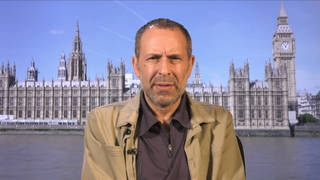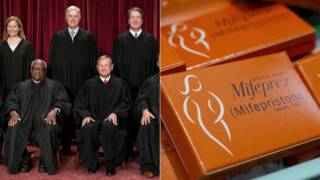
Related
The Supreme Court heard arguments this week about the legality of Idaho’s near-total abortion ban, which criminalizes the procedure in all circumstances unless the life of the parent is at risk. It’s the first such case to reach the high court since the conservative majority overturned Roe v. Wade in 2022. A key issue is whether a state ban can take precedence over the federal right to receive emergency care, including an abortion. The Biden administration argued that Idaho’s law violates the Emergency Medical Treatment and Active Labor Act, or EMTALA. If the justices side with Idaho, it could have major implications for reproductive care and worsen racial disparities for healthcare in at least half a dozen other states with similar bans. “People are going to die,” warns Karen Thompson, legal director of the nonprofit advocacy group Pregnancy Justice. “They are going to be bleeding out in hospital rooms. They’re going to be dying from sepsis because doctors are not going to be able to make the choices that they need to make to give people the care that will save their lives in these emergency situations.”
Transcript
AMY GOODMAN: This is Democracy Now! I’m Amy Goodman.
We turn now to the first Supreme Court case to examine a state ban on abortions since the justices overturned Roe v. Wade. In oral arguments Wednesday, Idaho said its abortion ban takes precedence over the federal right to receive emergency care, including an abortion. The Biden administration argued Idaho’s law violates the Emergency Medical Treatment and Active Labor Act by only providing emergency abortion care when a patient is facing death. This is U.S. Solicitor General Elizabeth Prelogar addressing the high court.
ELIZABETH PRELOGAR: Women in Idaho today are not getting treatment. They are getting airlifted out of the state to Salt Lake City and to neighboring states where there are health exceptions in their laws, because the doctors are facing mandatory minimum two years in prison, loss of their license, criminal prosecution. The doctors can’t provide the care, because — until they can conclude that a prosecutor looking over their shoulder won’t second guess that maybe it wasn’t really necessary to prevent death.
AMY GOODMAN: A ruling in this case will have major implications and, many fear, will worsen racial disparities for healthcare in at least half a dozen other states with similar bans. According to the Centers for Disease Control, more than 80% of pregnancy-related deaths in the U.S. are preventable, and Black women are three times more likely to die from pregnancy-related causes than white women.
For more, we’re joined by Karen Thompson, legal director of Pregnancy Justice, which defends the civil and human rights of pregnant people. Her group, along with the New York University Reproductive Justice Clinic, filed a brief in this Supreme Court case. She also has written a piece for The Nation headlined “This Supreme Court Case Could Worsen Maternal Health Nationwide.”
Welcome to Democracy Now!, Karen. It’s great to have you with us. Why don’t you lay out what this Idaho ban is all about, and specifically what it means when a patient goes into an emergency room and the kind of care that they get?
KAREN THOMPSON: Yes. So, EMTALA was created —
AMY GOODMAN: And EMTALA is?
KAREN THOMPSON: The Emergency Medical Treatment and Active Labor Act was passed in 1986 to prevent patient dumping. So the entire point of it was to ensure that everyone had stabilizing medical care when they presented at an ER. Post-Dobbs, we have Idaho with its almost complete abortion ban, saying that abortion care is basically criminalized. So we have this inherent conflict between what EMTALA is trying to provide and what Idaho is trying to actually criminalize and ban. And what that means is that people who need the care, people who present because their pregnancies are actually killing them, are, in Idaho, not able to get the care that they need.
AMY GOODMAN: So, if you can talk about what it means if a person goes into the emergency room, and the doctors — what they have to assess — if they’re septic, for example, that could lead to them being infertile? When do they decide if she is near death?
KAREN THOMPSON: That’s unclear. And that’s part of the problem. That was one of the questions that was asked on Wednesday.
AMY GOODMAN: Let’s go to that question right now, U.S. Solicitor General Elizabeth Prelogar being questioned by Justice Elena Kagan.
ELIZABETH PRELOGAR: So, in that situation, what Idaho is doing is waiting for women to wait and deteriorate and suffer the lifelong health consequences with no possible upside for the fetus. It just stacks tragedy upon tragedy.
JUSTICE ELENA KAGAN: And it can’t be the — you know, it’s become transfer is the appropriate standard of care in Idaho. But it can’t be the right standard of care to force somebody onto a helicopter.
AMY GOODMAN: Justice Samuel Alito used the language of “fetal personhood” in writing the court’s majority opinion when they overturned Dobbs — when they overturned Roe v. Wade in the Dobbs decision. This is Justice Alito speaking Wednesday.
JUSTICE SAMUEL ALITO: We’ve now heard, let’s see, an hour and a half of argument on this case. And one potentially very important phrase in EMTALA has hardly been mentioned. Maybe it hasn’t even been mentioned at all. And that is EMTALA’s reference to the woman’s, quote-unquote, “unborn child.” Isn’t that an odd phrase to put in a statute that imposes a mandate to perform abortions? Have you ever seen an abortion statute that uses the phrase “unborn child”?
ELIZABETH PRELOGAR: It’s not an odd phrase.
AMY GOODMAN: That was Samuel Alito. Explain exactly the implications of what he’s saying and what Justice Kagan was asking about.
KAREN THOMPSON: Alito is trying to assert this idea that the fetus replaces the pregnant person, that there are somehow more rights or equal rights for that fetus than the person who is actually dying. Right? And I don’t mean to be hyperbolic. People think that there’s a lot of hysteria going on. But the fact is, people are going to die. They are going to be bleeding out in hospital rooms. They’re going to be dying from sepsis, because — excuse me — because doctors are not going to be able to make the choices that they need to make to give people the care that will save their lives in these emergency situations.
AMY GOODMAN: So, how do doctors make these decisions?
KAREN THOMPSON: It’s tricky. They have to decide that someone is close enough to death. And that’s why we heard Kagan say that people are being airlifted, because doctors are scared to make those decisions. If they make the wrong decisions, what happens is that they can either get criminally charged and face two to five years in prison, they can have the family of the pregnant person sue them for $20,000 for performing the abortion, or they can lose their license. So, even if they are coming in with their best medical decisions, they’re still facing this prosecution, which is not exactly going to keep them making decisions that are going to be in favor of that pregnant person.
AMY GOODMAN: Were you surprised by the line of questioning at all?
KAREN THOMPSON: Completely. I was horrified. And I think what’s really interesting to hear is the voices of Justice Jackson, Justice Kagan and Justice Sotomayor, and even Justice Barrett. They were horrified by the line of questioning and the idea that someone’s health doesn’t matter, because the Idaho ban doesn’t allow any exceptions for abortion for the health of the mother, only for her life. And so, I think they were just absolutely gobsmacked at the idea that someone losing their fertility, someone suffering the pain of what’s actually going on with them would be ignored, again, for this fetus.
AMY GOODMAN: So, Karen Thompson, let’s talk about Idaho and the other states — I mean, we’re talking about a number of states who have these near-total bans on abortion — and how they affect maternal mortality, the rates going up in those states. And, of course, when it comes to maternal mortality, Black maternal mortality is always higher.
KAREN THOMPSON: Always. And that’s a legacy, sadly, and a remnant of slavery. We know that Black women are not trusted. They’re not given the same care. And what that leads to is poor fetal and maternal healthcare outcomes. If EMTALA is not allowed to stand, if those same women, if those same communities are showing at ERs for care for their pregnancies, for issues in their pregnancies, which they’re already experiencing at a higher level, then we’re going to see this kind of slippery slope of a lack of care for the people who need it the most. And it’s not a coincidence that these total ban states are really overlapping with the states of the Confederacy.
AMY GOODMAN: So, how are you organizing? And what is Pregnancy Justice doing?
KAREN THOMPSON: Well, we are fighting this idea of fetal personhood, because fetal personhood is the cause, it is the center, of so many other things. We saw that with the IVF decision in Alabama. We saw that with the mifepristone arguments last week in the Supreme Court.
AMY GOODMAN: The abortion pill.
KAREN THOMPSON: The abortion pill. So, we are trying to fight this idea that a fetus has the same rights as you and I, because from that space grows all sorts of pregnancy criminalization.
AMY GOODMAN: Now, in Idaho, when the ban went into effect, hospitals had to medically evacuate several women to receive emergency abortion care, evacuate them to other states?
KAREN THOMPSON: Absolutely, because the doctors, again, are afraid to provide the care that these people need, right? But if you don’t have a doctor near you, if you don’t have the care at the hospital in your community, you have to go somewhere to get it. And that care might include abortions. And if Idaho is not going to provide it, you have to go to Washington, you have to go to neighboring states, to make sure that it is provided. And so, that’s what — we’re seeing that happen, six medevaced cases in the last four months.
AMY GOODMAN: Well, I want to thank you for being with us, Karen Thompson, legal director of Pregnancy Justice, national nonprofit that defends the civil and human rights of pregnant people. Her group, along with the NYU Reproductive Justice Clinic, filed a brief in the Supreme Court case. Her new piece for The Nation, we’ll link to at democracynow.org, “This Supreme Court Case Could Worsen Maternal Health Nationwide.”
Coming up, journalist and author Ari Berman argues the current Supreme Court is the product of minority rule. That’s right, five of the six conservative justices were chosen by two presidents. Both lost the popular vote in the United States: George W. Bush and President Trump. His new book is called Minority Rule: The Right-Wing Attack on the Will of the People — and the Fight to Resist It. Stay with us.












Media Options